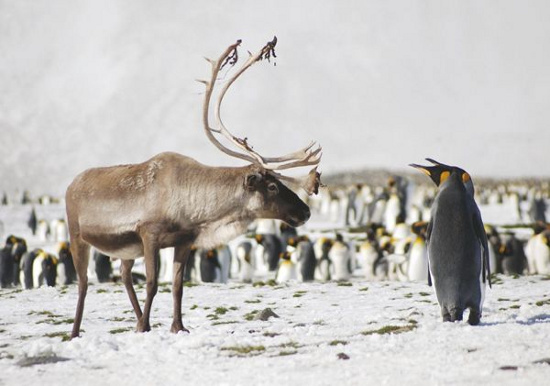Kill reindeer and mouse to protect birds
British officials will carry out a program to destroy reindeer and rats on an island in the southern Atlantic Ocean to protect the island's birds.
About 3,000 reindeer are destroying trees, causing erosion on South Georgia Island. They also destroy the nest and habitat of emperor penguins and many other native birds. So they became a major threat to the island's environment, the BBC reported.
Previously reindeer did not exist on South Georgia island. In 1911, whale hunters in Antarctica brought 10 reindeer to the island to get fresh meat.

Reindeer threatens the life of the penguin
soles and many other birds on South Georgia Island.
A group of people grazing Sami in Norway has arrived in South Georgia and is preparing for the reindeer. Sami people live with reindeer so their knowledge will become useful in their efforts to destroy them. They will set up animal traps with surrounding barriers. After driving the reindeer into it, they will shoot them. Reindeer meat will be taken to the Falkland Islands to sell to people, because scientists and government employees are the only subjects to South Georgia.
Kill reindeer is just one of two programs that control the number of animals on South Georgia Island. The bigger task is to remove mice, animals that have been to the island thanks to whaling and seals hunting ships in the 18th and 19th centuries. The mice multiply very quickly because they have no natural enemies. Currently their number has reached about 200 million. They eat bird eggs and young birds. Two species of birds endemic to the island are facing extinction because of mice.
From next February, scientists will throw poison baits at an area of 580 km 2 on the island to reduce the number of mice. They hope that the killing of rats and reindeer will increase the number of birds on the island to 100 million.
South Georgia Island, located in the southern Atlantic Ocean, is one of Britain's overseas territories. Legendary captain James Cook claimed the island in the name of England in 1775. Because of the island's influence on the Antarctic climate, the ice covered 3/4 of the island's area throughout the year.
- This cute reindeer seaweed reindeer is hiding a heartbreaking truth
- The reason for hundreds of reindeer in Norway was struck by lightning
- Why does Santa choose car pull reindeer?
- Interesting things about reindeer
- Why is Santa's reindeer nose red?
- Is Santa's reindeer red nose real?
- Fluorescent paint on reindeer antlers to prevent accidents
- Reindeer with snow
- Foreign mice are eating two million young birds on the British island
- Unexpected white reindeer suddenly appeared in Sweden
- 300,000 reindeer gathered to avoid flies and mosquitoes
- Over 200 shockingly hungry Norwegian reindeer
 Animal 'suffering' after hibernation
Animal 'suffering' after hibernation Why do goats climb well?
Why do goats climb well? Scientists were surprised to see chimpanzees eating turtles
Scientists were surprised to see chimpanzees eating turtles Giant catfish died deadly due to drought in Thailand
Giant catfish died deadly due to drought in Thailand Mysterious Skull Island: A place where tourists can only see but not set foot
Mysterious Skull Island: A place where tourists can only see but not set foot  Revealing the mystery of the woman who lived alone for nearly two decades on a deserted island
Revealing the mystery of the woman who lived alone for nearly two decades on a deserted island  Giant cockroaches thought extinct 80 years ago suddenly appear in Australia
Giant cockroaches thought extinct 80 years ago suddenly appear in Australia  Why is it difficult to attract people to live on this beautiful island, which has houses provided by the government for 20,000 USD?
Why is it difficult to attract people to live on this beautiful island, which has houses provided by the government for 20,000 USD?  The mysterious 'Eye' island floating in the middle of the swamp
The mysterious 'Eye' island floating in the middle of the swamp  The world's first artificial energy island
The world's first artificial energy island 